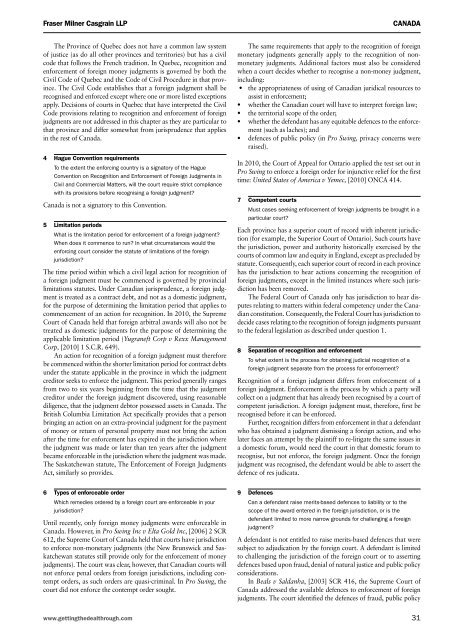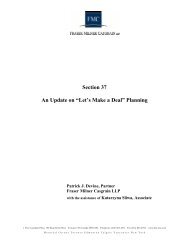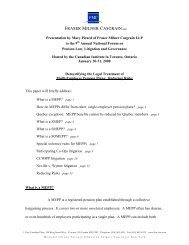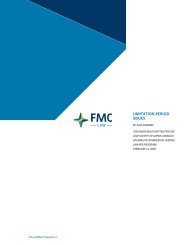Enforcement of Foreign Judgments - Fraser Milner Casgrain
Enforcement of Foreign Judgments - Fraser Milner Casgrain
Enforcement of Foreign Judgments - Fraser Milner Casgrain
Create successful ePaper yourself
Turn your PDF publications into a flip-book with our unique Google optimized e-Paper software.
<strong>Fraser</strong> <strong>Milner</strong> <strong>Casgrain</strong> LLP Canada<br />
The Province <strong>of</strong> Quebec does not have a common law system<br />
<strong>of</strong> justice (as do all other provinces and territories) but has a civil<br />
code that follows the French tradition. In Quebec, recognition and<br />
enforcement <strong>of</strong> foreign money judgments is governed by both the<br />
Civil Code <strong>of</strong> Quebec and the Code <strong>of</strong> Civil Procedure in that province.<br />
The Civil Code establishes that a foreign judgment shall be<br />
recognised and enforced except where one or more listed exceptions<br />
apply. Decisions <strong>of</strong> courts in Quebec that have interpreted the Civil<br />
Code provisions relating to recognition and enforcement <strong>of</strong> foreign<br />
judgments are not addressed in this chapter as they are particular to<br />
that province and differ somewhat from jurisprudence that applies<br />
in the rest <strong>of</strong> Canada.<br />
4 Hague Convention requirements<br />
To the extent the enforcing country is a signatory <strong>of</strong> the Hague<br />
Convention on Recognition and <strong>Enforcement</strong> <strong>of</strong> <strong>Foreign</strong> <strong>Judgments</strong> in<br />
Civil and Commercial Matters, will the court require strict compliance<br />
with its provisions before recognising a foreign judgment?<br />
Canada is not a signatory to this Convention.<br />
5 Limitation periods<br />
What is the limitation period for enforcement <strong>of</strong> a foreign judgment?<br />
When does it commence to run? In what circumstances would the<br />
enforcing court consider the statute <strong>of</strong> limitations <strong>of</strong> the foreign<br />
jurisdiction?<br />
The time period within which a civil legal action for recognition <strong>of</strong><br />
a foreign judgment must be commenced is governed by provincial<br />
limitations statutes. Under Canadian jurisprudence, a foreign judgment<br />
is treated as a contract debt, and not as a domestic judgment,<br />
for the purpose <strong>of</strong> determining the limitation period that applies to<br />
commencement <strong>of</strong> an action for recognition. In 2010, the Supreme<br />
Court <strong>of</strong> Canada held that foreign arbitral awards will also not be<br />
treated as domestic judgments for the purpose <strong>of</strong> determining the<br />
applicable limitation period (Yugraneft Corp v Rexx Management<br />
Corp, [2010] 1 S.C.R. 649).<br />
An action for recognition <strong>of</strong> a foreign judgment must therefore<br />
be commenced within the shorter limitation period for contract debts<br />
under the statute applicable in the province in which the judgment<br />
creditor seeks to enforce the judgment. This period generally ranges<br />
from two to six years beginning from the time that the judgment<br />
creditor under the foreign judgment discovered, using reasonable<br />
diligence, that the judgment debtor possessed assets in Canada. The<br />
British Columbia Limitation Act specifically provides that a person<br />
bringing an action on an extra-provincial judgment for the payment<br />
<strong>of</strong> money or return <strong>of</strong> personal property must not bring the action<br />
after the time for enforcement has expired in the jurisdiction where<br />
the judgment was made or later than ten years after the judgment<br />
became enforceable in the jurisdiction where the judgment was made.<br />
The Saskatchewan statute, The <strong>Enforcement</strong> <strong>of</strong> <strong>Foreign</strong> <strong>Judgments</strong><br />
Act, similarly so provides.<br />
6 Types <strong>of</strong> enforceable order<br />
Which remedies ordered by a foreign court are enforceable in your<br />
jurisdiction?<br />
Until recently, only foreign money judgments were enforceable in<br />
Canada. However, in Pro Swing Inc v Elta Gold Inc, [2006] 2 SCR<br />
612, the Supreme Court <strong>of</strong> Canada held that courts have jurisdiction<br />
to enforce non-monetary judgments (the New Brunswick and Saskatchewan<br />
statutes still provide only for the enforcement <strong>of</strong> money<br />
judgments). The court was clear, however, that Canadian courts will<br />
not enforce penal orders from foreign jurisdictions, including contempt<br />
orders, as such orders are quasi-criminal. In Pro Swing, the<br />
court did not enforce the contempt order sought.<br />
The same requirements that apply to the recognition <strong>of</strong> foreign<br />
monetary judgments generally apply to the recognition <strong>of</strong> non-<br />
monetary judgments. Additional factors must also be considered<br />
when a court decides whether to recognise a non-money judgment,<br />
including:<br />
• the appropriateness <strong>of</strong> using <strong>of</strong> Canadian juridical resources to<br />
assist in enforcement;<br />
• whether the Canadian court will have to interpret foreign law;<br />
• the territorial scope <strong>of</strong> the order;<br />
• whether the defendant has any equitable defences to the enforcement<br />
(such as laches); and<br />
• defences <strong>of</strong> public policy (in Pro Swing, privacy concerns were<br />
raised).<br />
In 2010, the Court <strong>of</strong> Appeal for Ontario applied the test set out in<br />
Pro Swing to enforce a foreign order for injunctive relief for the first<br />
time: United States <strong>of</strong> America v Yemec, [2010] ONCA 414.<br />
7 Competent courts<br />
Must cases seeking enforcement <strong>of</strong> foreign judgments be brought in a<br />
particular court?<br />
Each province has a superior court <strong>of</strong> record with inherent jurisdiction<br />
(for example, the Superior Court <strong>of</strong> Ontario). Such courts have<br />
the jurisdiction, power and authority historically exercised by the<br />
courts <strong>of</strong> common law and equity in England, except as precluded by<br />
statute. Consequently, each superior court <strong>of</strong> record in each province<br />
has the jurisdiction to hear actions concerning the recognition <strong>of</strong><br />
foreign judgments, except in the limited instances where such jurisdiction<br />
has been removed.<br />
The Federal Court <strong>of</strong> Canada only has jurisdiction to hear disputes<br />
relating to matters within federal competency under the Canadian<br />
constitution. Consequently, the Federal Court has jurisdiction to<br />
decide cases relating to the recognition <strong>of</strong> foreign judgments pursuant<br />
to the federal legislation as described under question 1.<br />
8 Separation <strong>of</strong> recognition and enforcement<br />
To what extent is the process for obtaining judicial recognition <strong>of</strong> a<br />
foreign judgment separate from the process for enforcement?<br />
Recognition <strong>of</strong> a foreign judgment differs from enforcement <strong>of</strong> a<br />
foreign judgment. <strong>Enforcement</strong> is the process by which a party will<br />
collect on a judgment that has already been recognised by a court <strong>of</strong><br />
competent jurisdiction. A foreign judgment must, therefore, first be<br />
recognised before it can be enforced.<br />
Further, recognition differs from enforcement in that a defendant<br />
who has obtained a judgment dismissing a foreign action, and who<br />
later faces an attempt by the plaintiff to re-litigate the same issues in<br />
a domestic forum, would need the court in that domestic forum to<br />
recognise, but not enforce, the foreign judgment. Once the foreign<br />
judgment was recognised, the defendant would be able to assert the<br />
defence <strong>of</strong> res judicata.<br />
9 Defences<br />
Can a defendant raise merits-based defences to liability or to the<br />
scope <strong>of</strong> the award entered in the foreign jurisdiction, or is the<br />
defendant limited to more narrow grounds for challenging a foreign<br />
judgment?<br />
A defendant is not entitled to raise merits-based defences that were<br />
subject to adjudication by the foreign court. A defendant is limited<br />
to challenging the jurisdiction <strong>of</strong> the foreign court or to asserting<br />
defences based upon fraud, denial <strong>of</strong> natural justice and public policy<br />
considerations.<br />
In Beals v Saldanha, [2003] SCR 416, the Supreme Court <strong>of</strong><br />
Canada addressed the available defences to enforcement <strong>of</strong> foreign<br />
judgments. The court identified the defences <strong>of</strong> fraud, public policy<br />
www.gettingthedealthrough.com 31






